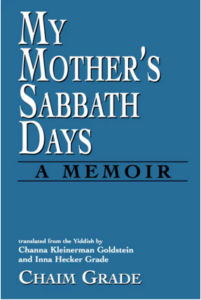By Rabbi Dr. Israel Drazin

BOCA RATON, Florida — My Mother’s Sabbath Days is a beautiful, fascinating, and eye-opening story by the Yiddish writer Chaim Grade (1910-1982). His name is pronounced gra, as in open your mouth and say ah, and de at the end pronounced as in eh, the word said in surprise. Grade in German and Yiddish means “straight.” Since his first name Chaim in Hebrew means “life,” his two names can be translated as “a straight life.” David Remnick discussed the Swedish Academy Nobel Prizes in Literature in the September 5, 2022, The New Yorker. He describes the failures of the Academy. Few people know anything about the 1901 first recipient Sally Prudhomme today. Remnick lists other forgotten authors and famous writers who received no award, such as Chekhov, Kafka, Borges, Orwell, Twain, and a long list more. Isaac Bashevis Singer (1902-1991) won the award in 1978. Remnick does not mention him. But many, including Prize winners, are convinced that Grade was a far better writer and he deserved the Prize.
Grade’s early writings were poetry. There are nine volumes of his poetry. My Quarrel with Hersh Rasseyner, published in 1952, was Grade’s first work as a novelist. He was successful, and other splendid, thoughtful dramas followed. The book is based on Grade’s life. It is so good that other writers made it into a film and a play. It is about the different opinions of Judaism by two former classmates at an Orthodox yeshiva. Grade and his fictional counterpart in the tale left the yeshiva and became a secular Jew because they felt the lessons of the yeshiva were wrong, even harmful. Rasseyner continued his life living the yeshiva beliefs. The Grade stand-in argues that Jews must open their minds to the enlightenment. Hersh Rasseyner argues fervently that only observant Jews are faithful Jews. The story is a classic because of its lasting merit. Its message is still relevant today despite being first printed 70 years ago because it addresses the current dispute between secular and observant Jews. It highlights the conflict caused in the past and today. The conflict between being Orthodox and secular is also one of the many themes in this book.
 Grade was raised in an Orthodox family. His tragic father, who is only briefly described in this memoir, was a champion of the enlightenment who challenged, as did his son, rabbinical rulings. But his mother, Vella, depicted extensively in this memoir, was very devout. It was from her that he took his artistic, poetic nature. She agonized as she saw her only living child turning away from Orthodoxy. She was married to a much older man and had two daughters with him, both of whom died in infancy. Her husband became sick and was unable to help obtain money for his family. They were extremely poor. They lived in a small space in Vilna, Lithuania. Polish forces occupied Vilna in 1920, and before the outbreak of World War II, the city of Vilna was part of northeastern Poland. Under the terms of the German-Soviet Pact, Vilna, along with the rest of eastern Poland, was occupied by Soviet forces in late September 1939.
Grade was raised in an Orthodox family. His tragic father, who is only briefly described in this memoir, was a champion of the enlightenment who challenged, as did his son, rabbinical rulings. But his mother, Vella, depicted extensively in this memoir, was very devout. It was from her that he took his artistic, poetic nature. She agonized as she saw her only living child turning away from Orthodoxy. She was married to a much older man and had two daughters with him, both of whom died in infancy. Her husband became sick and was unable to help obtain money for his family. They were extremely poor. They lived in a small space in Vilna, Lithuania. Polish forces occupied Vilna in 1920, and before the outbreak of World War II, the city of Vilna was part of northeastern Poland. Under the terms of the German-Soviet Pact, Vilna, along with the rest of eastern Poland, was occupied by Soviet forces in late September 1939.
When the German forces invaded Vilna in 1941, Grade fled to Russia. Among the wealth of information, this book tells about his experiences as a refugee in Russia. He was convinced the Nazis would not harm women, so he left his mom and wife in Vilna. He was wrong. They murdered both of them, along with many other innocent women. He immigrated to America in 1948.
There is much to enjoy and much to learn from this splendid book. What is most striking in this book is the artistry and brilliant, interesting descriptions of the many Jewish and non-Jewish people that Grade encounters. The agonies of Grade’s mom move us. They show Grade as a first-class writer. We observe how the Jews deal with poverty and foolishly fight one another rather than unify and fight their mutual enemies. As a result, many unwisely turned to Communism which lured them with false promises of an ideal life in the Communist paradise. This behavior turned the semi-Fascist Polish regime to persecute many Jews. Many Jews who attempted to escape to Russia were arrested as spies and incarcerated in concentration camps. There is also, as previously suggested, the religious battle between Orthodoxy and secularism. What is it that alienates Grade from his mother’s religion? Is it something rational? Or is it the treatment that his mom, fellow citizens, and his fellow Jews suffer from the Russians and the Germans? Would life in Vilna have been better if Grade was Orthodox?
Readers of this volume will see why even in its English translation, partly done by Grade’s second wife after his death, is so highly praised.
*
Rabbi Dr. Israel Drazin is a retired brigadier general in the U.S. Army chaplain’s corps and the author of more than 50 books.